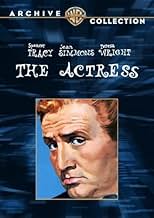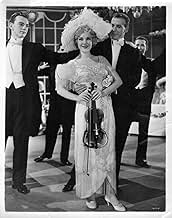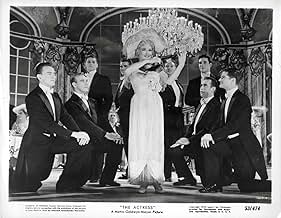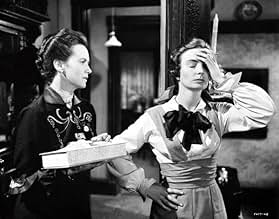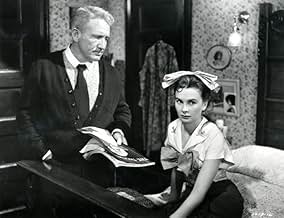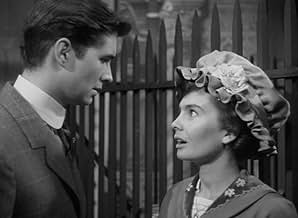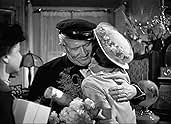IMDb-BEWERTUNG
6,4/10
1620
IHRE BEWERTUNG
Füge eine Handlung in deiner Sprache hinzuThis is an account of the real life experience of actress/playwright Ruth Gordon.This is an account of the real life experience of actress/playwright Ruth Gordon.This is an account of the real life experience of actress/playwright Ruth Gordon.
- Für 1 Oscar nominiert
- 2 Gewinne & 3 Nominierungen insgesamt
Erville Alderson
- Mike McGrath
- (Nicht genannt)
Hal Bell
- Chorus Boy in 'The Pink Lady'
- (Nicht genannt)
Jackie Coogan
- Inopportune
- (Nicht genannt)
Ken DuMain
- Spectator at Show
- (Nicht genannt)
James Elsegood
- Chorus Boy in 'The Pink Lady'
- (Nicht genannt)
Adolph Faylauer
- Spectator at Show
- (Nicht genannt)
Raoul Freeman
- Spectator at Show
- (Nicht genannt)
Robert Fuller
- Dancer
- (Nicht genannt)
Ed Fury
- Dance Partner
- (Nicht genannt)
Empfohlene Bewertungen
10rfkeser
Delightful turn-of-the-century comedy captures the silly, head-in-the-clouds flush of adolescence. Dreaming of the glamour and magic of the theatre, small-town romantic Jean Simmons waltzes around the decidedly earthbound household of her Papa: grizzled, opinionated sea-captain Spencer Tracy, who spends his time resisting the coming of the telephone. Anthony Perkins makes a charming screen debut as her beau in a raccoon coat [although the actor preferred to downplay it]. Director George Cukor lavishes warmth and affectionate detail on Ruth Gordon's fine script as he guides the cast through some of the most satisfying ensemble playing on the screen.
Ruth Gordon's play Years Ago, a sentimental reminiscence along the lines of Kathryn Forbes' Mama's Bank Account, looked at her stage-struck adolescence. In 1953, it became a movie, The Actress, directed by George Cukor, with the rarefied and mannered Jean Simmons taking the part of the straight-shooting Gordon. Oddly enough, the main character is not the aspiring actress but her father, played by Spencer Tracy.
In Clinton Jones, Gordon penned a difficult but irresistible character. Settled unarguably into middle age but still fighting it, he chafes at his $37.50-a-week salary (it was 1913) and pores over the grocery list while his wife (Teresa Wright) defends such frivolities as tangerines. A former sea captain, he latches onto any opportune ears like the Ancient Mariner and spins his salty yarns of ports of call on the seven seas. In the dead of a New England winter, he insists on sleeping in a hammock strung on an upstairs porch. The ham in Tracy rises to the challenge, and he manages to make Jones recklessly funny while still a bit frightening (near the end, details of his dreadful boyhood emerge to put his cantankerousness in focus).
As screenwriters, Gordon and her husband Garson Kanin custom-tailored many screen vehicles for Tracy and co-star Katharine Hepburn, where their relationship is said to take the writers' marriage as its model; here Tracy returns the favor by making Gordon's father so unforgettable. Gordon pays a tribute, too, by sketching her character not as she remembered it but as he must have seen her, showing little talent or wit but a penchant for dreaming up castles in Spain. By hiding her own bright light under a bushel, she lets the memory of her father shine.
In Clinton Jones, Gordon penned a difficult but irresistible character. Settled unarguably into middle age but still fighting it, he chafes at his $37.50-a-week salary (it was 1913) and pores over the grocery list while his wife (Teresa Wright) defends such frivolities as tangerines. A former sea captain, he latches onto any opportune ears like the Ancient Mariner and spins his salty yarns of ports of call on the seven seas. In the dead of a New England winter, he insists on sleeping in a hammock strung on an upstairs porch. The ham in Tracy rises to the challenge, and he manages to make Jones recklessly funny while still a bit frightening (near the end, details of his dreadful boyhood emerge to put his cantankerousness in focus).
As screenwriters, Gordon and her husband Garson Kanin custom-tailored many screen vehicles for Tracy and co-star Katharine Hepburn, where their relationship is said to take the writers' marriage as its model; here Tracy returns the favor by making Gordon's father so unforgettable. Gordon pays a tribute, too, by sketching her character not as she remembered it but as he must have seen her, showing little talent or wit but a penchant for dreaming up castles in Spain. By hiding her own bright light under a bushel, she lets the memory of her father shine.
This movie is so much more than a sentimental reminiscence. I'm not much at all for those "I remember..." mom or dad or whatever memory movies. Also, there are so many, many plays and movies about a family's career aspirations for a son, aspirations that get challenged because of what the son wants to do instead. Here we have a story set after the turn of the 20th century, about a working class father's career aspirations for his DAUGHTER - a career that will provide her with financial stability but isn't at all what she wants to do. Spencer Tracy plays a curmudgeon, working-class, not-at-all refined father in a role I've never seen him in before - and he's AMAZING. The dialogue has some one linters that are, at times, hysterical - any person who has every been embarrassed by their parents, or every had a parent say something like, "Why did you ever have to be so different?" will warm to this movie immediately. And the Mary Wickes moment is why she makes every movie better even if she's in it for less than 20 seconds.
I've liked many of George Cukor's films (PHILADELPHIA STORY, WHAT PRICE HOLLYWOOD, etc.) and am a huge Spencer Tracy fan so I was surprised I had never seen this 1953 flick. Based on Ruth Gordon's biographical play, this is a sweet, endearing film and it holds one of Spencer Tracy's best performances. He is so real, so good as the overwhelmed father - trying to deal with a turn of the century daughter who wants to be an actress (back then that was like saying you wanted to be a prostitute - theatre people were very looked down upon). Tracy (based on Ruth Gordon's real father) has wonderful scenes/speeches where he tries to lay down the law but later on, you see how much he loves his daughter and would do anything for her. Teresa Wright is good as always and the lovely Jean Simmons is superb as the young girl who has become star struck. Plus a very young Anthony Perkins making his screen debut as a possible suitor. Highly recommended
Set in 1913 New England, seventeen-year-old Ruth Gordon Jones (Jean Simmons) decides on a stage career at about the same time her father decides to send her to the Boston Physical Culture Institute to become a PE teacher. His inspiration is Emma Glavey (Mary Wickes).
Despite its title, "The Actress" (1953) is really Ruth Gordon's loving tribute to her parents; written at a time when she could look back and really appreciate them. It is based on a stage play she wrote and then adapted to the screen. Although primarily known today (because of a couple of cult films) for her acting, Gordon was an excellent writer of both plays and screenplays.
If you are looking for spectacular sets and exciting action adventure, "The Actress" is not the film for you. But if you are looking for some of the best dialogue out there and what is arguably Spencer Tracy's most amusing performance you should make it a point to track this down.
Gordon obviously got her love of performing from her father Clinton (played by Tracy), a one-time sailor with a gift for gab and a desire to pontificate and be the center of attention. The conflict in the story is not so much over her desire to become an actress, but between the tendency of both father and daughter to be overly dramatic. They tend to get on each other's nerves with the mother Annie (Teresa Wright) caught in the middle. Only the mother picks up on how alike father and daughter actually are, the old acorn never falls far from the tree thing.
Much of what Clinton says is too original not to have been invented by the author. My favorite is a lengthy piece about the family's grocery bills during which Clinton complains that Ruth is too lazy to walk to a nearby farm for three pounds of butter. Annie excuses her daughter's inactivity by citing her bad back. A little later when he notices that Annie has been buying expensive tangerines instead of oranges for Ruth's school lunch, he speculates that carrying the lighter tangerine is easier on her back.
Although Wright is a little young for her role, her uncanny resemblance to Gordon (some believed that she was actually Gordon's daughter) made casting her as Gordon's mother a nice inside joke.
This production is extremely funny and has a lot of charm. They go out on a cool shot of the cat on windowsill eating a plant; with the family visible through the window heading off to the railroad station.
Then again, what do I know? I'm only a child.
Despite its title, "The Actress" (1953) is really Ruth Gordon's loving tribute to her parents; written at a time when she could look back and really appreciate them. It is based on a stage play she wrote and then adapted to the screen. Although primarily known today (because of a couple of cult films) for her acting, Gordon was an excellent writer of both plays and screenplays.
If you are looking for spectacular sets and exciting action adventure, "The Actress" is not the film for you. But if you are looking for some of the best dialogue out there and what is arguably Spencer Tracy's most amusing performance you should make it a point to track this down.
Gordon obviously got her love of performing from her father Clinton (played by Tracy), a one-time sailor with a gift for gab and a desire to pontificate and be the center of attention. The conflict in the story is not so much over her desire to become an actress, but between the tendency of both father and daughter to be overly dramatic. They tend to get on each other's nerves with the mother Annie (Teresa Wright) caught in the middle. Only the mother picks up on how alike father and daughter actually are, the old acorn never falls far from the tree thing.
Much of what Clinton says is too original not to have been invented by the author. My favorite is a lengthy piece about the family's grocery bills during which Clinton complains that Ruth is too lazy to walk to a nearby farm for three pounds of butter. Annie excuses her daughter's inactivity by citing her bad back. A little later when he notices that Annie has been buying expensive tangerines instead of oranges for Ruth's school lunch, he speculates that carrying the lighter tangerine is easier on her back.
Although Wright is a little young for her role, her uncanny resemblance to Gordon (some believed that she was actually Gordon's daughter) made casting her as Gordon's mother a nice inside joke.
This production is extremely funny and has a lot of charm. They go out on a cool shot of the cat on windowsill eating a plant; with the family visible through the window heading off to the railroad station.
Then again, what do I know? I'm only a child.
Wusstest du schon
- WissenswertesFilm debut of Anthony Perkins.
- PatzerIn a scene late in the film, set in the kitchen, the light fixture over the kitchen table is seen (and heard!) to rise up to allow the camera to pass below it.
- Zitate
Annie Jones: Ruth, why don't you give up this going on the stage business and settle down with a nice man?
Ruth Gordon Jones: Oh, mama, don't be disgusting!
- Crazy CreditsOpening credits are shown over the cover of a photo album, and the film begins by showing us various photos from inside the album.
- VerbindungenFeatured in The Men Who Made the Movies: George Cukor (1973)
- SoundtracksSilent Night, Holy Night
(1818) (uncredited)
Music by Franz Xaver Gruber
In the score for photo album pictures
Top-Auswahl
Melde dich zum Bewerten an und greife auf die Watchlist für personalisierte Empfehlungen zu.
- How long is The Actress?Powered by Alexa
Details
Box Office
- Budget
- 1.424.000 $ (geschätzt)
- Laufzeit
- 1 Std. 30 Min.(90 min)
- Farbe
- Seitenverhältnis
- 1.37 : 1
Zu dieser Seite beitragen
Bearbeitung vorschlagen oder fehlenden Inhalt hinzufügen



